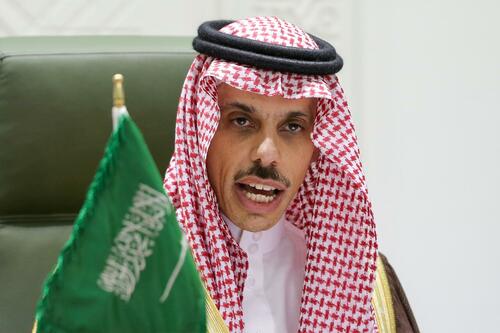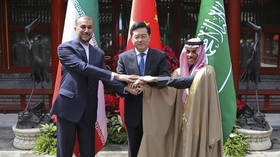Iran’s Hossein Amir-Abdollahian and Saudi Arabia’s Prince Faisal bin Farhan Al Saud intended to take steps towards reopening embassies and consulates in their mutual countries, Iran’s Ministry of Foreign Affairs said on its official Telegram channel.
Delegations headed by the two foreign ministers met for “expanded” bilateral talks to discuss “important issues,” and were expected to release a bilateral statement in the coming hours, according to Saudi state media.
Video released by Saudi state media on Thursday showed the two ministers joining hands while posing for photos, encouraged by Chinese Foreign Minister Qin Gang who was standing in the middle.
The meeting is the highest-level bilateral gathering of officials from Iran and Saudi Arabia in more than seven years and comes after they agreed to reestablish diplomatic ties following talks in Beijing in March.
At the time, Riyadh and Tehran said they planned to reopen their embassies within two months.
They also announced the intention to reimplement a security pact signed 22 years ago under which both parties agreed to cooperate on terrorism, drug-smuggling and money-laundering, as well as to revive a trade and technology deal from 1998.
The development was broadly seen as a diplomatic victory for China in a Gulf region that has long been considered part of the US’ domain of influence.
China’s top diplomat Wang Yi called the agreement a “victory for dialogue and a victory for peace,” and framed it as part of China’s “constructive role in facilitating the proper settlement of hot-spot issues around the world,” according to a statement from China’s Foreign Ministry at the time.
Riyadh severed ties with Tehran in 2016 after Iranian protesters stormed the Saudi embassy in the Iranian capital following the execution of a Shi’ite cleric in Saudi Arabia. Since then, they have fought a proxy war that has embroiled a number of neighboring countries, bringing the region ever closer to conflict.
The two countries have also supported opposite sides of a civil war in Yemen, which has been described by the United Nations as one the world’s worst humanitarian crises.
Saudi Arabia has, however, been engaged in direct talks with the Iran-aligned Houthi movement, and an unofficial ceasefire appears to be holding. CNN


